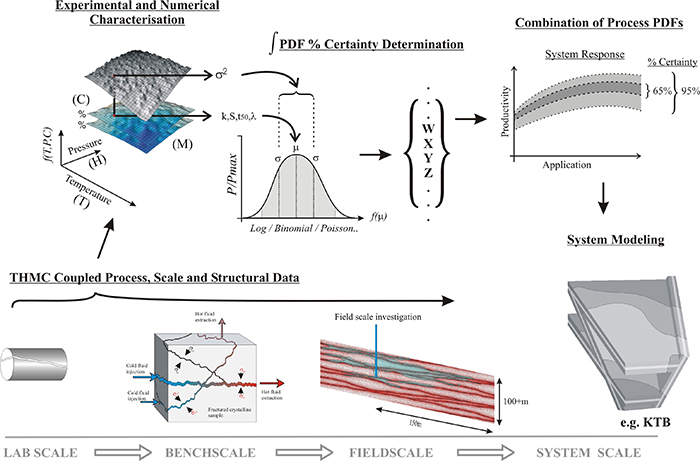Research Themes - Reservoir Modelling
Theme leaders: Ian Main & Sebastian Geiger
Predicting the flow of fluids, such as oil, gas, water, CO2, or heat through geological formations of subsurface reservoirs is very challenging because flow is inherently multi-scale and non-linear in nature as it involves thermal, hydraulic, mechanical, and chemical processes. At the microscopic level, fluids flow through the pores of buried sedimentary (and crystalline) rocks which are typically 1 to 100 micrometer across. Non-linear physical processes occurring at this scale, for example interfacial tension, viscosity, or fluid-rock reactions, determine how fluids move at the macroscopic scale. Macroscopically, the kilometre-sized reservoirs are highly heterogeneous because the deposition of sedimentary rocks changed with time and space and rock units are often faulted and fractured. Thus, the fundamental pore-scale processes vary with the local differences in pore structure. In addition, fluid flow can be subject to highly transient and localised events such as changing well-rates, artificially induced fractures, or earthquakes.
The mission of the ECOSSE reservoir modelling research theme is to improve the accuracy and utility of forecasting the response of fluid flow in subsurface reservoirs to changes induced by engineering practice. We are integrating expertise in numerical modelling and data analysis, building on the complementary research activities at the ECOSSE partner institutes. We have also established strong links to the Maxwell Institute of Mathematical Sciences and Edinburgh Parallel Computing Centre. Much of our research is of high practical and industrial relevance but also links into other ECOSSE research themes as it delivers the underpinning technology.
Four research groups are associated with the ECOSSE reservoir modelling theme, which currently hosts a total of nine ECOSSE PhD students
Uncertainty quantification (Mike Christie)
Computational hydrodynamics (Sebastian Geiger)
Statistical mechanics and earthquake predictability (Ian Main)
Coupled process modelling (Chris McDermott)


